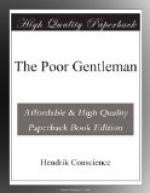But the rustic stared at his master with gaping mouth, as if he had been addressed in one of the dead languages. Seeing the predicament, and mastering it rapidly,—
“Excuse me,” said De Vlierbeck, rising; “he would not find it, I fear. I will be back in a moment.”
Rushing into the kitchen, he seized the third and last bottle and descended to the cellar, where he stopped to draw breath and compose himself.
“Chateau-margaux! hochheimer! champagne!" exclaimed poor De Vlierbeck, “and not another drop of wine in my house but what is in this last bottle of claret! What shall I do? what can I do?” continued he, as he held the cobwebbed bottle in one hand and stroked his chin with the other. “But no matter: there’s no time for reflection: the die is cast, and may God help me in my need!”
He ascended the stair, entered the dining-room with the corkscrew in the last cork, and found that during his absence Lenora had ordered fresh glasses on the table.
“This wine,” said De Vlierbeck, holding the bottle knowingly to the light, “is at least twenty years old, Monsieur Denecker, and I sincerely hope it will please your palate.” So saying, he filled the glasses of uncle and nephew, and gazed anxiously in their faces for the verdict.
Denecker tasted the wine, drop by drop, like an epicure, and, shaking his head disappointedly,—
“There’s a mistake, doubtless,” said he; “for it’s the identical wine we had before.”
De Vlierbeck feigned surprise admirably, tasted the wine in turn, and replied,—
“I believe you are right, and that I have made a mistake; yet, as the bottle is opened and not bad, suppose we drink it before I make another descent to the cellar’ There’s abundance of time.”
“I’ve no objection,” answered the merchant, “provided you help us, so as to get through it the quicker.” And so the column in the third and last bottle diminished more rapidly than its predecessors, till two or three glasses alone remained at the bottom to crown the festival.
Poor De Vlierbeck could no longer conceal his agitation. He tried to keep his eyes off the fatal bottle; but a sort of fascination drew him back to it, and each time with increased anxiety. That dreadful word ‘Chateau-margaux’ rang in his ears. His face blushed and grew pale, and a cold, clammy sweat stood in big beads on his forehead. Yet he felt that he had not entirely exhausted his resources, and resolved to fight the battle of humiliation to the end. He wiped his brow and cheeks, coughed, and turned aside as if about to sneeze. By dint of these manoeuvres he continued to conceal his nervousness till Denecker grasped the bottle to pour out its last drop. As he clasped the neck, a chill seized the hysterical frame of the poor gentleman, a deadly paleness overspread his features, and his head fell with a groan against the tall back of the chair. Was it in truth a fainting-fit, or did the sufferer take advantage of his emotion to play a part and escape the embarrassment of his situation?




